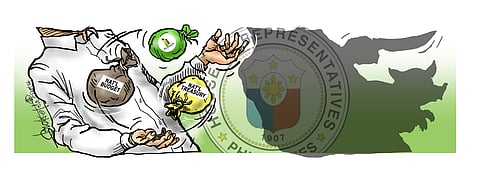
- NEWS
- the EDIT
- COMMENTARY
- BUSINESS
- LIFE
- SHOW
- ACTION
- GLOBAL GOALS
- SNAPS
- DYARYO TIRADA
- MORE

The juggling of funds in the budget has always been a source of suspicion in the aftermath of the Supreme Court (SC) decision in 2014 declaring unconstitutional specific schemes to create the Disbursement Acceleration Program (DAP).
While the controversy over the transfer of P89.9 billion in funds of the Philippine Health Insurance Corp. (PhilHealth) to the National Treasury may not fall within the methods that the SC restricted, suspicions remain about its purpose.
The SC ruling barred the creation of savings prior to the end of the fiscal year and the withdrawal of those funds for implementing agencies; the cross-border transfer of the savings from one branch of government to another; and the allotment of funds for projects, activities, and programs not outlined in the General Appropriations Act.
The PhilHealth funds’ reallocation was a stark reminder of how the DAP started.
Sometime in October 2011, Budget Secretary Butch Abad created a money pool with P72.11 billion sourced from savings that could be used for priority projects like National Housing Authority programs, capitalization of the Bangko Sentral ng Pilipinas, and peace and development interventions in the Autonomous Region in Muslim Mindanao.
DAP money was raised by pooling unobligated allotments and withdrawing unreleased appropriations from various departments and agencies and declaring them savings; through the release of unprogrammed funds; and by applying savings and unprogrammed funds to augment existing programs, activities, or projects (PAPs) or to support other priority PAPs.
While the Department of Finance (DoF) argued that it received a favorable legal opinion on the transfer and that PhilHealth’s idle funds were subsidies and not part of its reserve funds nor was it income that the Universal Health Care Act restricts from being used by the national government as a general fund, valid questions were raised about the transfer.
Senator Christopher “Bong” Go, chairperson of the Senate health panel, said the funds must stay with PhilHealth to address the already deficient healthcare services.
Several former finance secretaries signed a manifesto declaring their support for the move of Finance Secretary Ralph Recto to transfer the funds for use by the central government. Yet experts said the move also clashed with the primacy of Congress to allocate funds and with the budget law. At the very least, economists said, the money taken from PhilHealth should be considered borrowings and must be returned for use in health programs.
University of the Philippines (UP) economics professor Ramon Clarete said the funds stopped being a subsidy. “While PhilHealth is a government-owned and controlled-corporation, it is an insurance company mandated to cover health benefits,” he said.
Another UP economist, Cielo Magno, a former finance undersecretary, said a case has been filed before the SC questioning the legality of the Recto order.
“Actually, the foundation of the question before the court is whether the provision in the General Appropriations Act can amend the provisions of the Universal Health Care Act,” which does not allow the transfer, she said.
“Under that law, it’s very specific that funds allocated to PhilHealth can only be used to broaden the services of PhilHealth, or to lower premiums. There’s nothing there that says the DoF can take the money of PhilHealth to finance other government projects,” she pointed out.
She said that this makes it illegal for the DoF to take away the money that is in PhilHealth right now. Magno added that the fund transfer “is a huge fiscal management issue” that the SC should resolve.
Moreover, she described it as “bastardizing” the budgeting process. Instead of taking money from PhilHealth to finance other projects, Magno said the government should look at expanding the coverage of the state-led health insurer.
The timing of the transfer also raises doubts about its ultimate objective. Suspicions are rife since it is about this time, months before the election season, that political groups scrounge around for pork barrel and campaign funds.
